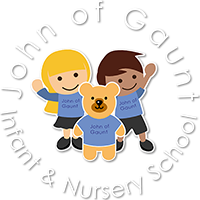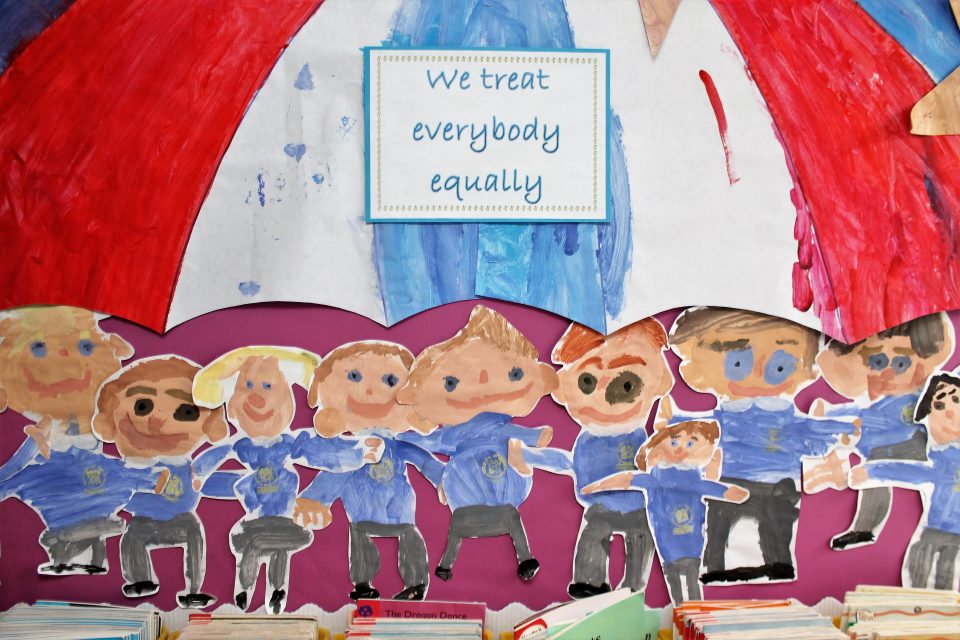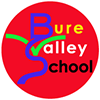British Values & the Prevention of Terrorism
The Department of Education have recently reinforced the need “to create and enforce a clear and rigorous expectation on all schools to promote the fundamental British values of democracy, the rule of law, individual liberty and mutual respect and tolerance of those with different faiths and beliefs.”
The Government set out its definition of British values in the 2011 Prevent Strategy, and these values have been reiterated by the Prime Minister. At John of Gaunt Infant and Nursery School, these values are reinforced regularly and in the following ways:
Democracy
Children are actively encouraged to have a voice and share their views and opinions regularly, through the following methods:
- School council
Every term we have a class elections for School Councillors. The school council representatives (2 per class) meet every 2-3 weeks then take the ideas from the meetings back to their classes for discussion.
A noticeboard displays the names of the School Councillors and minutes of their meetings.
Mutual Respect
Mutual respect is at the heart of our values. Children learn that their behaviours have an effect on their own rights and those of others in the following ways.
- High expectations of behaviour modelled by all adults in school.
- Unacceptable behaviours are not tolerated. They are challenged, discussed with children and appropriate consequences given, where necessary.
- Inappropriate behaviour (including disrespectful and racist incidents) is recorded appropriately.
- Children are praised and rewarded for displaying respect for others, during ‘Smile’ assemblies.
Tolerance of those of different faiths and beliefs
John of Gaunt Infant and Nursery School is situated in an area which is not culturally diverse, therefore we place significant emphasis on promoting diversity with the children in the following ways:
- Curriculum - Our curriculum promotes respect, tolerance and diversity. Children are encouraged to express themselves through discussions, debates and consultations. The RE (Religious Education), PSHE (Personal, Social and Health Education), Citizenship and SMSC (Spiritual, Moral, Social and Cultural) provision is embedded across the curriculum through the use of the Norfolk Agreed RE Syllabus and PSHE curriculum. Across the Key Stage, children explore a number of world faiths (Judaism, Sikhism, Hinduism, Buddhism and Islam), alongside their learning about Christianity. Other opportunities are provided to learn about different cultures and beliefs, for example, through stories read aloud, the choice of texts used in lessons, internet research, role play, art and music. Children are also taught about how to stay safe when using the internet.
- Assemblies – whole-school and Class assemblies. These are regularly planned to address this issue either directly or through the inclusion of stories and celebrations from a variety of faiths and cultures.
- Visiting speakers – to enrich the curriculum and widen the children’s learning opportunities.
- Community Events - children participate in local community events e.g. the community Carol Service, so that they appreciate and value their neighbours and friends who may not share their faith background.
The Rule of Law
The importance of laws (whether those that govern the class, the school, or the country), is consistently reinforced throughout the school day through:
- A rigorous Behaviour Policy – this is implemented fairly and consistently. Children are taught the value and reasons behind laws, that they govern and protect us, the responsibilities that this involves and the consequences when laws are broken. Detailed, accurate records of behaviour within school are maintained and used when communicating with parents.
- School rules, rewards and sanctions – these are referred to regularly and consistently. Adults have extremely high expectations and model the desired behaviour on a daily basis.
- PSHE lessons – at John of Gaunt Infant and Nursery School we focus on PSEHE every day but lessons are taught every week and include our RSE learning too. PSHE and RSE learning is reinforced in whole-school assemblies (including those delivered by regular outside speakers, such as the local vicar).
- Visiting speakers - visits from external speakers, such as the Police, help reinforce this message.
Preventing Radicalisation and Extremism
‘Radicalisation’ is defined as the act or process of making a person more radical or favouring of extreme or fundamental changes in political, economic or social conditions, institutions or habits of the mind.
‘Extremism’ is defined as the holding of extreme political or religious views.
The Governing Board of the Aylsham Learning Federation has a zero tolerance approach to extremist behaviour for all school community members. We rely on our strong values to steer our work and ensure the pastoral care of our children protects them from exposure to negative influences.
John of Gaunt Infant and Nursery School is fully committed to safeguarding and promoting the welfare of all its children. As a school we recognise that safeguarding against radicalisation is no different from safeguarding against any other vulnerability. Staff have received specific training in ‘PREVENT’, the Government’s response to help counter extreme ideologies. All staff are expected to uphold and promote the fundamental principles of British values, including democracy, the rule of law, individual liberty and mutual respect, and tolerance of those with different faiths and beliefs.
We are a school for all




